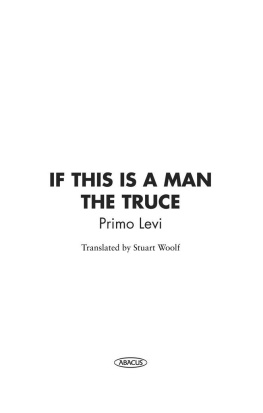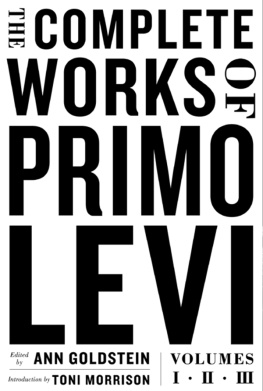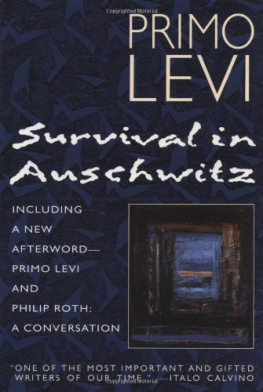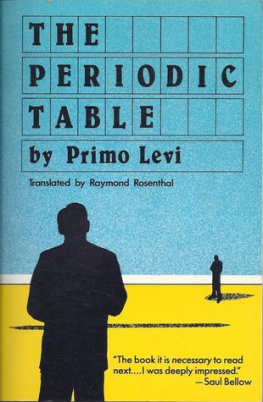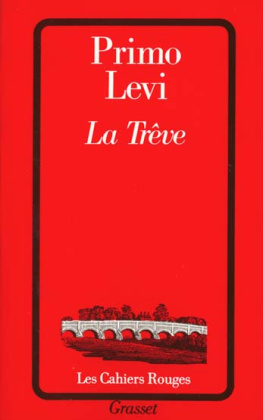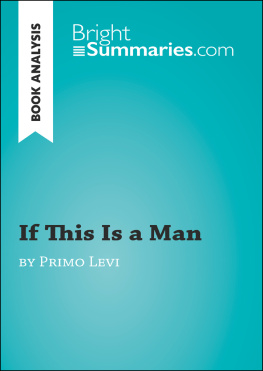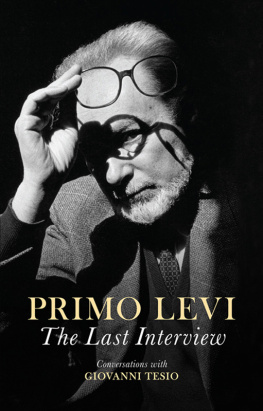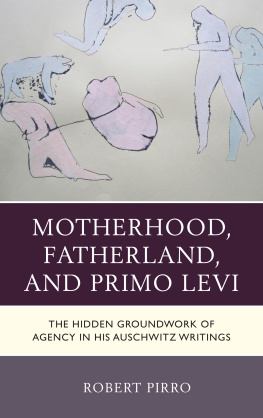Primo Levi - If This Is A Man/The Truce
Here you can read online Primo Levi - If This Is A Man/The Truce full text of the book (entire story) in english for free. Download pdf and epub, get meaning, cover and reviews about this ebook. year: 2014, publisher: Little, Brown, genre: Detective and thriller. Description of the work, (preface) as well as reviews are available. Best literature library LitArk.com created for fans of good reading and offers a wide selection of genres:
Romance novel
Science fiction
Adventure
Detective
Science
History
Home and family
Prose
Art
Politics
Computer
Non-fiction
Religion
Business
Children
Humor
Choose a favorite category and find really read worthwhile books. Enjoy immersion in the world of imagination, feel the emotions of the characters or learn something new for yourself, make an fascinating discovery.
- Book:If This Is A Man/The Truce
- Author:
- Publisher:Little, Brown
- Genre:
- Year:2014
- Rating:5 / 5
- Favourites:Add to favourites
- Your mark:
- 100
- 1
- 2
- 3
- 4
- 5
If This Is A Man/The Truce: summary, description and annotation
We offer to read an annotation, description, summary or preface (depends on what the author of the book "If This Is A Man/The Truce" wrote himself). If you haven't found the necessary information about the book — write in the comments, we will try to find it.
If This Is A Man/The Truce — read online for free the complete book (whole text) full work
Below is the text of the book, divided by pages. System saving the place of the last page read, allows you to conveniently read the book "If This Is A Man/The Truce" online for free, without having to search again every time where you left off. Put a bookmark, and you can go to the page where you finished reading at any time.
Font size:
Interval:
Bookmark:
Primo Levi was born in Turin in 1919 and trained as a chemist. Arrested as a member of the anti-fascist resistance during the war, he was deported to Auschwitz. His experiences there are described in his two classic autobiographical works, If This is a Man and The Truce. He also wrote a number of universally highly acclaimed novels and essay collections, including If Not Now, When?, Moments of Reprieve and The Wrench. The Drowned and the Saved, Levis impassioned attempt to understand the rationale behind the concentration camps, was completed shortly before his tragic death in Turin in 1987.
The Wrench
The Drowned and the Saved
The Mirror Maker
Published by Abacus
978-1-4055-2819-1
All characters and events in this publication, other than those clearly in the public domain, are fictitious and any resemblance to real persons, living or dead, is purely coincidental.
Se questounuomo first published in Italy 1958
Copyright Giulio Einaudi editore S.p.A. 1958
This translation first published by The Orion Press 1969
Copyright The Orion Press 1960
La Tregun first published in Italy 1963
Copyright Giulio Einaudi editore S.p.A. 1963
This translation first published by The Bodley Head 1965
Copyright The Bodley Head 1965
The moral right of the author has been asserted.
Afterword copyright New Statesman 1971
Introduction copyright Howard Jacobson 2013
All rights reserved. No part of this publication may be reproduced, stored in a retrieval system, or transmitted, in any form or by any means, without the prior permission in writing of the publisher.
The publisher is not responsible for websites (or their content) that are not owned by the publisher.
ABACUS
Little, Brown Book Group
100 Victoria Embankment
London, EC4Y 0DY
www.littlebrown.co.uk
www.hachette.co.uk
Table of Contents
The danger, as time goes by, is that we will tire of hearing about the Holocaust, grow not only weary but disbelieving, and that out of fatigue and ignorance more than cynicism, we will belittle and by stages finally deny actively or by default the horror of the extermination camps and the witness, by then so many fading memories, of those who experienced them. The obligation to remember is inscribed on every Holocaust memorial, but even the words Never Forget become irksome eventually. We dont like being reminded of our obligations, we dont want to go on taking the medicine, especially when we dont accept that we are sick. So it is important that a writer such as Primo Levi is not sold to future generations as being good for them. Again and again Primo Levis work is described as indispensable, essential, necessary. None of those terms overstates the case: but they do prepare readers new to Levi for a forbiddingly educative experience, making him a writer unlike all others, and the experience of reading him a chore. Which it isnt.
The friendlier language to which enthusiastic publishers and reviewers sometimes have recourse is hardly more appropriate to the case. It means nothing to say of any writer that he is readable or a page turner and Primo Levi is certainly not one you read in a single sitting without pausing for breath. There is much that makes one pause in If This is a Man, the record of Primo Levis eleven-month incarceration in Auschwitz, much one cannot read without needing to lay aside the book and inhale the breath of common air. But while it would be foolish to describe him as an entertainer, he nevertheless engages the readers interest in a story and an illumination, in character, in description, et cetera as any other imaginative writer does. His subject is humanity in extremis but it is still humanity. He does not stand outside the compendious narrative of human life to which every writer is committed. Nor is he the end of the line. Things happen in If This is a Man that are beyond ordinary daily experience but it is still us to whom they are happening, and the understanding Primo Levi seeks is no different in kind to that sought by Shakespeare in King Lear, or Conrad in The Heart of Darkness.
So if we approach If This is a Man expecting a historical investigation of the rise of Nazism and the potency of its appeal to the German people, or an enquiry into the origins and nature of evil, we ask both too much and too little of it. Primo Levi is neither historian nor metaphysician. As a matter of honour, no less than as a matter of writerly decency perhaps as a mark of respect to mankind he refuses grandiose philosophising or theology. We do not believe, he writes, in the most obvious and facile deduction: that man is fundamentally brutal, egoistic and stupid in his conduct once every civilised institution is taken away We believe, rather, that the only conclusion to be drawn is that in the face of driving necessity and physical disabilities many social habits and instincts are reduced to silence.
The quietness of that conclusion, so determinedly rational and even matter-of-fact, so calm in its rejection of the consolations of rage or blame or despair, is characteristically heart-breaking. Reduced to silence is a humane but terrible description of mans fate in the camps; it is inevitable, final, an attrition of spirit of which the beatings and the humiliations are just the foretaste, and which can only be atoned for, all round, by the opposite to silence. This is what the book is for. It must speak of what happened, of what it knows, for the very reason that silence the removal of the will and wherewithal to speak, and the fear of never being listened to or believed was the ultimate aim of that system of dehumanisation Nazism embraced, and the proof it had succeeded.
The subject of If This is a Man is not how could men do such things, but what was it that they did, how did it fall to some prisoners (the saved) to endure it and others (the drowned) not to, what is left when everything but the barest capacity to endure, the power only to refuse our consent, is driven out, and by what means are some still able to impress on others the suggestion of a world not corrupt, not savage, extraneous to hatred and terror a remote possibility of good.
From the first pages of the book the essential project of the camps is laid bare: it is, in Levis words, the demolition of a man. Through small and large acts of deprivation and destruction we follow the process: the removal of hope, of dignity, of luxury, of necessity, of self; the reduction of a man to a hoarder of grey slabs of bread and the scrapings of a soup bowl (wonderfully told all this, with a novelists gift for detail and sometimes very nearly comic surprise), to the confinement of a narrow bed in which there is not even any room to be afraid with a stranger who doesnt speak your language, to the cruel illogicality of hating a fellow victim of oppression more than you hate the oppressor himself one torment following another, and even the bleak comfort of thinking you might have touched rock bottom denied you as, when the most immediate cause of a particular stress comes to an end, you are grievously amazed to see that another one lies behind; and in reality a whole series of others.
With grievous amazement, never self-pitying but sometimes bordering on a sort of numbed wonderment, Levi records the day to day personal and social history of the camp, noting not only the fine gradations of his own descent, but the capacity of some prisoners to cut a deal and strike a bargain, while others, destined by their age or character for the gas ovens, follow the slope down to the bottom, like streams that run down to the sea.
Font size:
Interval:
Bookmark:
Similar books «If This Is A Man/The Truce»
Look at similar books to If This Is A Man/The Truce. We have selected literature similar in name and meaning in the hope of providing readers with more options to find new, interesting, not yet read works.
Discussion, reviews of the book If This Is A Man/The Truce and just readers' own opinions. Leave your comments, write what you think about the work, its meaning or the main characters. Specify what exactly you liked and what you didn't like, and why you think so.

